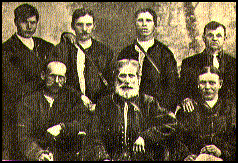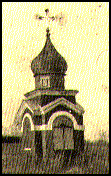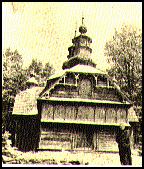|
Chapter 21 |
Echoes of struggle for freedom in Lemkivshchyna
Before World War [ I ], Lemkivshchyna, that beautiful corner of Ukraine, was so clouded by moscophilism that it seemed it would be completely lost to the Ukrainian idea. For many years Lemkivshchyna had been nurtured in the moscophile spirit by various, unconscionable agitators and it put all the hopes of its unenviable fate in Russia's might. Ukrainians were very poorly organized in Lemkivshchyna, in addition they exercised only a small influence on the people. Whenever they tried to distribute their periodicals and books, opponents always found a way to paralyze their efforts. In this, these opponents held nothing back, but hammered such hatred not only to the Ukrainian idea, but to the very name Ukraine, into unenlightened people that to this day it is difficult for the people to grow out of this brain-washing.
It is also true that Ukrainians either took very little interest in Lemkivshchyna or took no interest at all. They did not try to get to know their brothers to the west, nor influence them, nor nurture them in the Ukrainian concept. How little our Galicia concerned itself with Lemkivshchyna we see from the fact that when Ukrainians were being gathered into a newly arisen Ukrainian republic, Lemkivshchyna was spoken of fleetingly and unclearly. Lemkivshchyna had been saddled almost exclusively with moscophile priests and teachers. For some reason, Ukrainians were afraid to settle among the Lemkos. They were inhibited by the Lemko dialect, the great distance from eastern Galicia and the inaccessibility of the mountains.
There were only a few more active individuals, like the late Yavorsky in Novy Sanch, Maritchak in Yaslo and the late Rev. Kisilovsky in Hrab, who carried on educational work as well as they were able to. But there were too few of these workers. So, the moscophiles were able to exercise exclusive influence over the people and were able to strengthen their own ideas in them. Their main objective was the establishment of Russian Orthodoxy in the villages of Lemkivshchyna, which had as its goal the destruction not only of the Ukrainian church but of the nation and to strengthen even further the leaning of the people to the all-powerful tsar.
Then the First World War broke out. Having lived through the great desolation which the war brought with it, the war also served to stymie the local population's movement toward moscophilism. Shrewd agitators who tried all means to propagate moscophilism prudently disappeared from the scene. Their students, the people, convicted of treason were left behind in Austrian death camps. Many others left with retreating Russian troops and were scattered, primarily throughout Ukraine. There they recognized that Ukrainians, by their speech and customs were the same as they themselves and that the Great Russians, who they had felt a kinship with, were distant and unlike themselves. These people looked for the establishment of a Ukrainian state, some worked in Ukrainian organizations. Indeed, some even fought with the Ukrainian army.
This movement must have influenced their consciousness and having returned home they brought with them a change in their former moscophile views. Also, the unconscionable work of moscophile provocateurs in Russia removed their enthusiasm for the much feted "unity" of the Galician nation with the Great Russian nation. In addition, Russian troops, among whom were no small group of Ukrainians irrevocably changed those who had remained at home. Ukrainian soldiers, although not so sure of their own uniqueness still in all felt that the Lemkos were closer to them than their Russian comrades. Their speech and appearance united them. Even Russian commanders made a distinction between Lemkos and their own soldiers. They assured the Lemkos that they were "khokhly", just like the "khokhly " that served in the Russian army; that they were quite distinct from the Great Russian "katsapy". These names, used to signify differences between Ukrainians and Russians, have remained in use to this day.
These " khokhly " even taught our people Ukrainian songs, among which the song, "Kateryno, vrazha dochko, shcho ty uchynyla", has long since been sung by young Lemkos. They kept company with our people rather than with their own "katsap" army buddies.
The influence of Ukrainian units of the Russian army in Lemkivshchyna plus the enlightenment of our people who returned from war-time Russia could not help but contribute to the diminution and weakening of the old moscophile views of the Lemkos. Lemkos began to take more interest in the Ukrainian movement and hoped that Ukrainians, unlike previously, would take more interest in them. These hopes were developing while the world war was drawing to a close.
The initial hope of Lemkos developed from the establishment of peace talks at Brest-Litovsk between the young Ukrainian republic and surrounding countries. In some villages of Lemkivshchyna this was an occasion for solemn Divine Liturgies to be served with great participation of the people. Lemkos started to believe that the new state would take the poor, war-ravaged and forgotten Lemkivshchyna under its wing. From that moment Lemkivshchyna was flooded with many different rumors, that would build up the Lemkos' hopes, only to dash them again. At the end of October, 1918, the Lemkos heard that Emperor Charles published a manifest in which he promised a restructuring of Austria into national states. Among others, a Ukrainian state would arise in eastern Galicia; that each nation would elect a popular council which would decide its own aspirations for statehood. They heard that Ukrainians in Lviv declared an independent state, encompassing all the territory inhabited by Ukrainians including Lemkivshchyna. And in the beginning of November, 1918, "reliable" reports criss-crossed Lemkivshchyna, such as one that Ukrainian troops, having occupied Lviv, Striy and Drohobych were coming to the aid of Lemkivshchyna and the Ugro-Rusyns, some by way of northern Hungary and others from Syanik. This rumor was very characteristic of Lemkos' hopes. Thanks to it, in one village in Yaslo county, something on the order of a militia was formed, which planned to join up with the advancing Ukrainian army. Placing hope on future aid, a flood of councils and public meetings began, which took place in almost every village. However, the old provocateurs who again appeared in Lemkivshchyna took advantage of these meetings. They saw the present sympathies of the people to the Ukrainian movement and understood that the nation, which after the suffering in Thalerhof and Russia, would turn away from them. They, therefore, adroitly, took this movement into their own hands. They immediately joined up with the Ukrainians and pretended to be great friends. Because at that moment they could not afford to irritate them. The people heard about the battle for the minds of Ukrainians being waged in eastern Galicia and realized that the old slogans of the agitators; that the Ukrainians and the Poles are all the same was just an evil trumped-up idea. In the end the Ukrainians extended their newly established state into Lemkivshchyna.
The public meetings began in Horlytsi county. It was immediately asked
there not to divide the people into parties, but to work toward their goals
as a united front. And it seemed that the people would abandon their old
road and turn completely to the Ukrainian state. However, it didn't work out
that way. Agitators, seeing that Ukrainians in Lemkivshchyna were weak and
that there was no hope of strengthening the Ukrainian state did an
about-face. With all their might they began to destroy the Lemkos' sympathy
to the Ukrainian idea, and began to draw the nation to themselves by means of
the old demagoguery as well as by using new slogans; " that the Ukrainians
broke Russia apart, that they were only pretending to battle the Poles, that
they betrayed the Lemkos to Thalerhof and so on". And so that it would seem
that they were doing something for the nation, they coined a slogan that
Lemkivshchyna could not by any right belong to Poland.
From this flood of public meetings it is worth mentioning at least a few
to show how moscophile agitators were destroying the expectations of Lemkos
and their sympathies toward the Ukrainian idea.
On November 17, 1918 an informational public meeting took place in Svyatkova, at which a moscophile agitator, Sobin, tried to break up the crowd, dividing them into moscophiles and Ukrainians.
Lemko farmers (hospodari) - as witnesses in the trial of Bendasyuv,
Koldra, and associates in 1914.

The Polish authorities tolerated the public meetings from the beginning as well as the establishment of the Rusyn Council, because the Polish government was very weak and disorganized, as well as the fact that the expected battle between the Ukrainians and moscophiles would turn out to their own benefit. However, already by December of 1918 Poland began to look more closely at and took more interest in Lemkivshchyna. They sent their "legionnaires" there, customs-border guards, they sent out draft notices for the Polish army, asked for elections of various committees and so on.
In the meantime former captives were making their way home from Russia by various routes through Galicia. Many of them had been in the Ukrainian army and no longer wanted to serve, but were fleeing home as quickly as possible, wearing blue-yellow insignias on their caps and bringing varied news back concerning the course of the Polish-Ukrainian war.
The people got news by way of Hungarian Ukraine that in Stanislaviv on January 3, 1919 a union of all Austro-Hungarian Ukraine with Great Ukraine had been proclaimed. Again the people took heart, because they believed Lemkivshchyna was to take part in that union and that the help of the young Ukrainian state was not far off.
Beautiful road chapel in the village
Shlakhotskiy Voroblyk.

The Rusyn Council held some secret meetings and decided to send a delegation to Czechoslovakia with a request for annexation. Various rumors were circulated concerning the tour of these delegates; that Czechoslovakia would take the Lemkos under its wing if Ukraine would agree to it, but was not receptive to a republic for Lemkos. Even the main delegate, Rev. Yurchakevich confessed that it would be for the best if the Lemkos joined with the Ukrainians of eastern Galicia. There was also some discussion that Czechoslovakia would be receptive to annexation of Lemkivshchyna to its own republic until Russia rebuilds following the war! Such a desire was indeed put forth by the Rusyn Council in public meetings in Florynka, Brunary near Hrybiv, in Krinitsya and in other localities.
On account of this, Polish publications raised a commotion, directing
the attention of Polish authorities to the work of "good-hearted, honest
old-Rusyns". In a report from Novy Sanch, "Czechoslovak-Rusyn Intrigues in
Lemkivshchyna", the Krakow Illustrated Courier, having presented the
agitation of the old-Rusyns for annexation of Lemkivshchyna to the
Czecho-Slovak republic, with the help of a proclamation by Czech officials
distributed under the title, "Hlas ruskoho lidu"(Voice of the Rusyn People) and
published in
Czech and Ukrainian, asks that the Polish government would take an interest
in this agitation because, "it is unheard of that in our own country, groups
of dissidents and seditionists of all kinds would roam the entire
Sub-Carpathian region without punishment." At the head of the
Rusyn-Czechoslovak action stood the ambassador to the Galician Seym (Sejm), Kurilovich, a notary from Syanik, a lawyer
from Mushyna, Dr. Hassay who as an old-Rusyn man trusted in the Czech government in Prague, a former emissary to the
Hungarian Seym, Dr. Beskid from Pryashiv, the editor of "Holos Ruskoho Naroda"(Voice of the Rusyn People) in Pryashiv, Dmitro
Vislotski and others. A proclamation from
February 9, 1919 declares in the name of Lemkos that "from today forward
Lemkivshchyna is to be considered an autonomous part of the Czecho-Slovak
republic." And the Pryashiv "Voice of the Rusyn People", the organ of the
Carpatho-Rusyn National Council in a report from Lemkivshchyna " in the most
definitive way" protested against "the division of Carpatho-Russia and
demanded on the basis of a national vote the right of self-determination in
the northwest Carpathians, that is to say Lemkivshchyna".
Ancient church (tserkva) in Mshana, near Dukla; before the war [ WW I ]
"soul shepherding" was conducted by father Stepan Tarnovich.

However, these were only rumors of which there were many at that time.
Meanwhile, Lemko delegates traveled around Czechoslovakia, conferring, bargaining and feasting while the people back home filled themselves up with rumors, waited and were left in the dark.
In the meantime, Polish rule was reinforcing itself in Lemkivshchyna.
Border villages were immediately planted with so-called "legionnaires", who
together with customs-border guards, were not only supposed to guard the
borders against contraband and smugglers, but were also supposed to carefully
scrutinize the agitation, which was flowing from that area. Also, punitive
raids were sent into villages in which leaders of the Czech orientation were
headquartered and with one swipe they were liquidated.
Still, for a time, hollow rumors circulated among Lemko villages that the Lemkos would be annexed to the Czecho-Slovak republic. This news originated in America, which also was concerning itself with the fate of Lemkivshchyna.
Meanwhile, the Ukrainian army, exhausted from lop-sided battles with the Bolsheviks, Poles, Hungarians and Romanians, decimated by typhus, without the necessary amount of arms, dependent only on its own strength, finally had to reduce itself and retreat beyond the Zbruch river.
In eastern Galicia Polish regiments advanced triumphantly. The Lemkos
felt these failures and lost all hope, which they had been living with that
Ukrainians, having conquered eastern Galicia would take up the Lemko cause.
Equally, the expectation that Lemkivshchyna would be annexed to
Czechoslovakia fell by the wayside. Agitation was stifled and leaders of the
Czech organization hid themselves...
In "Ukrainskomu Skitaltsi"(Ukrainian Wanderer), Liberets, 1920. No. 4, we find valuable materials written by Volodimir Vinohradski "Z dniv borot'by..."(From the Days of Battle, Memoirs of the November Cataclysm in Balyhorod and Lisko).
Again from a report by Dr. Mikhailo Filets, "Z dorohi zi Zakopanoho do L'vova" (From the Road from Zakopane to Lviv), we find out that between November 1 and November 4, 1918 news was received from Novy Sanch that Ukrainians from the 10th infantry regiment had been disarmed and interned, which meant the internment of Ukrainians in Zakopane. Ukrainian sergeants were determined to regain authority over the 10th regiment, however as a result of informants, the Poles preceded, disarmed and interned them. This happened the night of November 1, 1918.
About 800 infantrymen and 35 commanders were interned then. But they were soon freed. The commanders, scattered widely about Lemkivshchyna, began to educate the Lemkos and inform them about the situation which existed in the eastern part of the country.
In Syanik the Poles took authority into their own hands. Zahirya, on the 7th of November, 1918 found itself in Ukrainian hands. Poles and Jews were admitted to the police force. The Poles there comprised a vanishing minority. The police force was organized by social democrats.
Finally, the actions of the "Regional Commissariat of Vyslik and Komancha" were very important.
The movement in Lemkivshchyna, although it did not bring about the
expected results, had as a silver lining, the breaking down of long-lastinggainst Ukrainian orientation. Ukrainian hopes and aspirations
dating from these great times were not in vain...
The people clamor for Ukrainians books and periodicals which they never heard of or saw before.
This all led to the fact that Lemkivshchyna, in spite of Orthodoxy, in spite of difficult circumstances, would enter into the pure waters of a national rebirth. This movement encompassed all Lemkivshchyna and no power could have torn it apart.
Back to Homepage
Translated by Richard Trojanowski.
Fox Lake, IL 60041
Copyright © (c) Richard Trojanowski, All rights reserved.
Local Links:
Document Information Document URL: http://lemko.org/lih/lihchp21.html
Page prepared by Walter Maksimovich
E-mail: walter@lemko.org
Copyright © LV Productions, Ltd.
E-mail: webmaster@lemko.org
© LV Productions, Ltd.
Originally Composed: September 1st, 1996
Date last modified: February 25th, 2003
